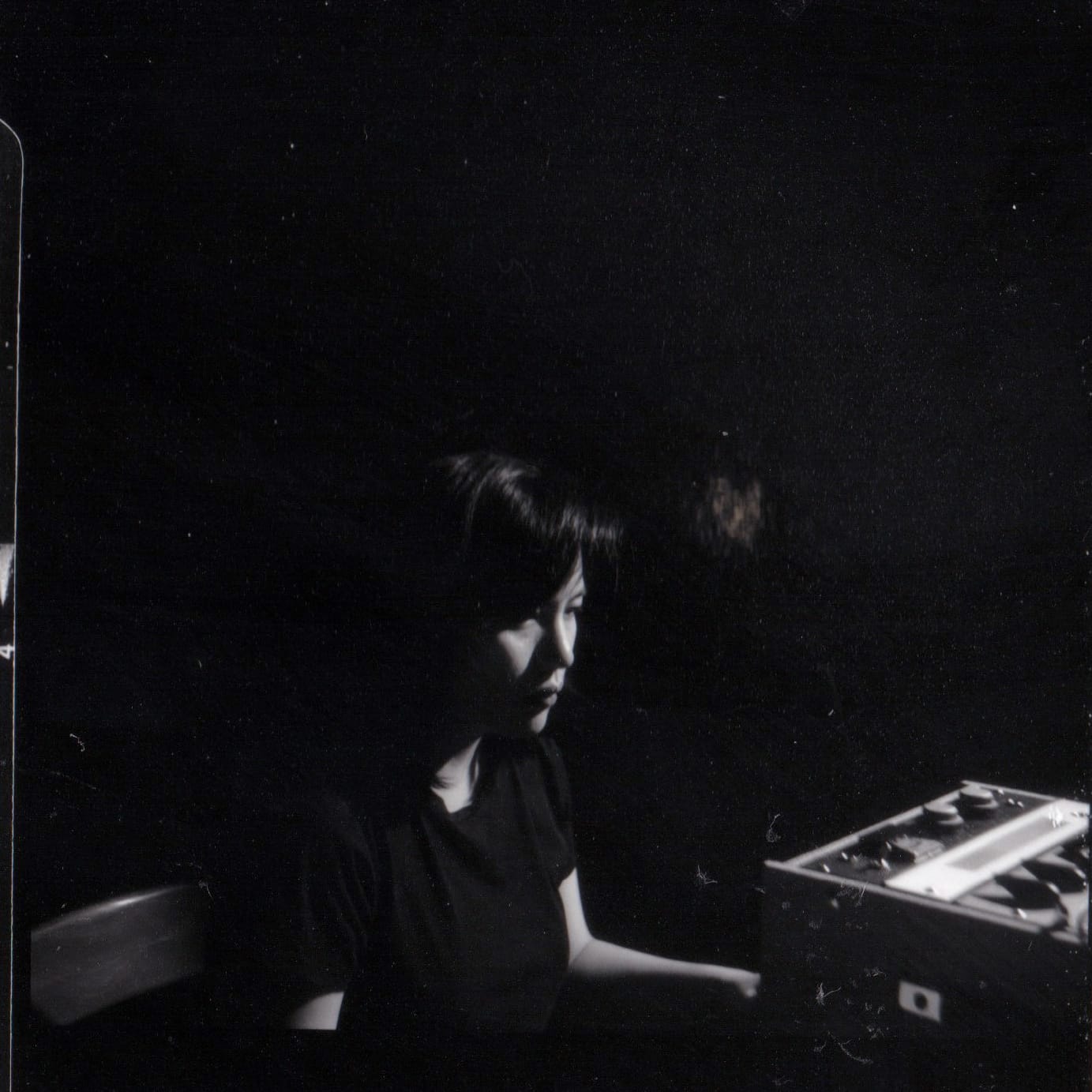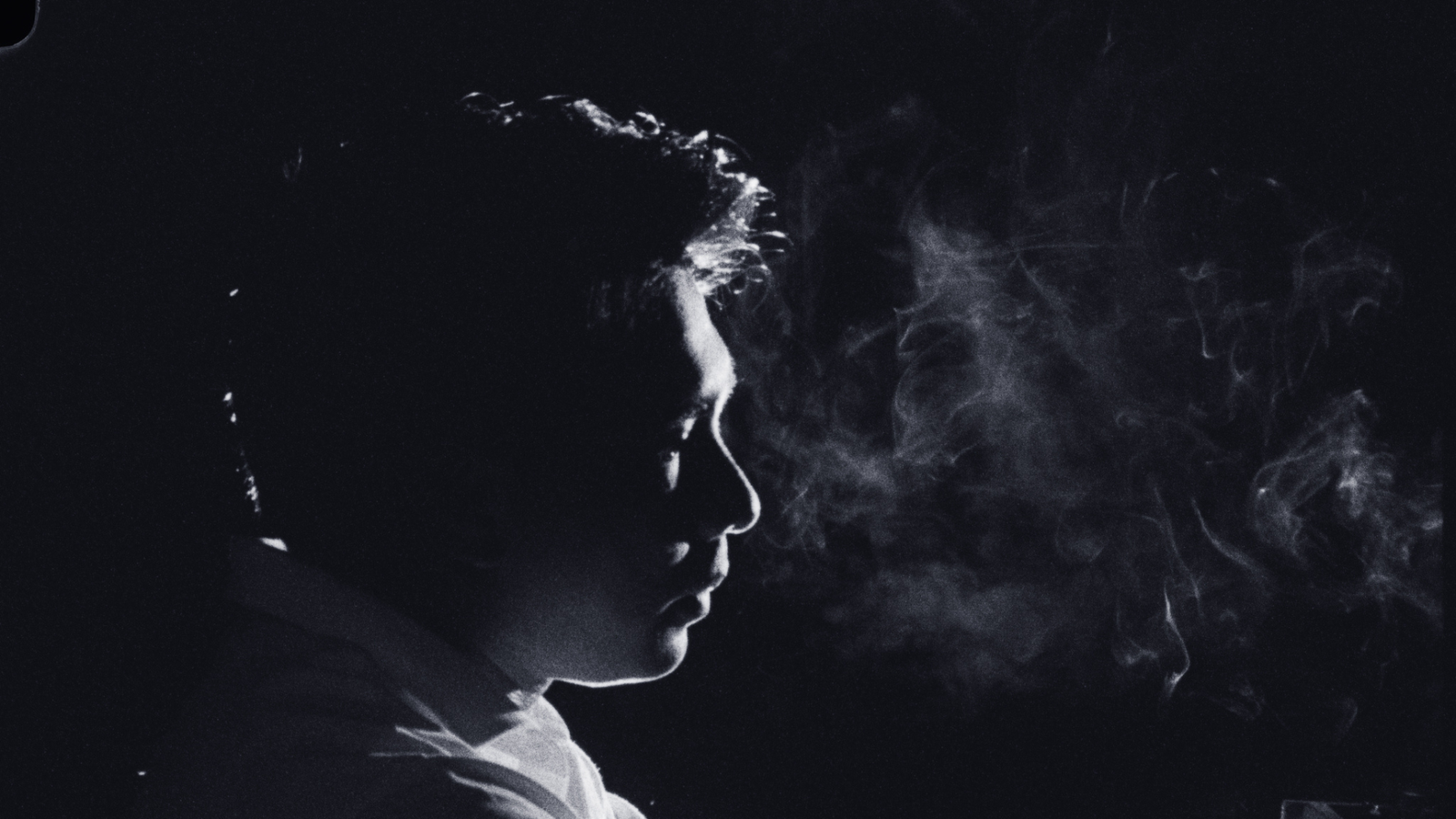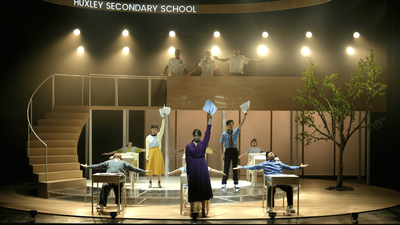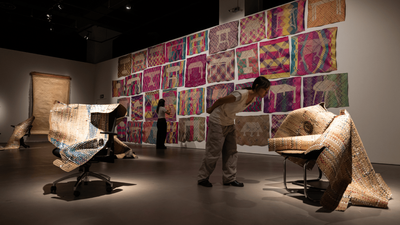“Small Hours of the Night” opens on a young man smoking a cigarette. Half cast in shadow, he cuts a pensive, enigmatic figure. Two unhurried minutes pass before he notices another person nearby. Without pleasantries, but not unkindly, like he has been expecting the arrival of someone familiar, he invites them to sit down. His eyes linger on them, and he breaks his gaze only when offscreen, a hesitant female voice ventures: “You know, I know we have a very good relationship. And you’re always so kind to me.”
In Daniel Hui’s layered new film, an interrogator (Irfan Kasban) and a prisoner (Yang Yanxuan Vicki) reckon with their personal history over one long, rainy night. The duo’s relationship, now complicated by a steep power differential, parallels the political dynamic between the Singaporean state and its subjects, where the former has the authority to both grant and withhold the latter’s freedom depending on their conformity, and where non-compliance has not just legal but also social and personal ramifications.
But the characters’ opening exchange also suggests a tacit agreement between the filmmaker and his audience. We’re invited to sit down, then held hostage as we attempt to figure out our relationship with the director and his film: how he draws out time, tests our patience and our sympathies. Throughout this intense chamber psychodrama, we become complicit bystanders to the harsh questioning and violent gaslighting of the imprisoned woman. Over the course of her interrogation, she invokes various marginalised figures: real-life defendants in Singapore’s history, and a fictional present-day researcher—also named Vicki—who is looking into these actual cases.
Destabilising power, questioning authority, speculative and alternative histories, centering marginal figures and their stories: Hui’s fourth feature shares many themes with his previous two. But where “Snakeskin” (2014) combined time travel with documentary-style footage to discuss the contradictions in the official tellings of Singapore’s history, and “Demons” (2018) was a satirical send-up exposing abuse and complicity in the process of artistic creation, here Hui uses the insular and intimate chamber drama form to examine how legal structures not only shape a society’s accepted norms but also seep into interpersonal relationships. Just as transactional elements permeate relationships under capitalism, so do legal frameworks engender power imbalances between individuals.
“Small Hours of the Night” spotlights two legal cases from the 1980s: one obscure and largely forgotten, the other major and shocking even by today’s standards. The first involves Tan Chay Wa, a senior official of the Malayan National Liberation Front, an arm of the Communist Party of Malaysia, who fled to Malaysia in 1976 to evade Singapore’s crackdown on communists. He was later arrested and sentenced to death for the then-capital offence of possessing a gun and ammunition. His body was brought back to Singapore by his brother Tan Chu Boon, who sought to fulfil his late sibling’s request to have his tombstone inscribed, eulogising him as a martyr. For this, Chu Boon was charged by the Singapore government for sedition. The second case features the Toa Payoh ritual murders of 1981, in which self-styled healer Adrian Lim, a notorious conman and abuser, and his “holy wives” Catherine Tai Mui Choo and Hoe Kah Hong, killed two children; all three were sentenced to death.
While both cases may have occupied local headlines at the time—the second is still cited as one of the most infamous crimes in Singapore’s history—Hui chooses to focus not on their sensational nature but on the humanity of the figures at the heart of these incidents. He conveys how they were victims of circumstance who suffered grave injustice, and seeks to remedy this by having their perspectives aired via Vicki as a conduit. Running counter to the conventional storytelling principle of showing rather than telling, Hui strips away all visual evidence associated with these cases in the court of law and its extension, the media. What’s left is their raw, heartfelt testimony.
The legal intricacies of the cases depicted have so far piqued the most public interest. But I am most compelled by the ways in which the film itself embodies various forms of caring. The most visible of these is, perhaps, the act of looking closely. Hui’s attentiveness is apparent across various dimensions of the film, whether stylistically or narratively. His archival research deliberately focuses on small incidents in history, rather than watershed ones; for instance, the two main cases bookend a recitation of the dates and details of the trials of trivial crimes in the 1970s and 1980s, all presided over by EC Foenander, a long-time prosecutor and judge.
Hui also uses 16mm film rather than shooting digitally, and the film’s meticulous sound design further immerses viewers in the stark, claustrophobic interiors the actors inhabit. His attention extends not just to the poetic and austere ways in which he frames his actors’ faces in chiaroscuro closeups, but also to small beings: the insects and spiders that scurry across frames, resilient creatures that have withstood generations of harsh conditions and concerted efforts to stamp them out.
Berenice Fisher and Joan Tronto, political scientists and pioneers in the field of contemporary care ethics, propose that care is a “species activity that includes everything that we do to maintain, continue, and repair our ‘world’ so that we can live in it as well as possible”. They conceive of a key component of caring, “caring about”, as “paying attention to our world in such a way that we focus on continuity, maintenance and repair”. Hui isn’t just attentive to his craft. He’s also established a continuity in the maintenance of relationships by regularly working with friends and repeat collaborators; “Snakeskin”, “Demons” and “Small Hours of the Night” all feature a character named Vicki, played by the same actress, one of Hui’s closest friends. Long-term collaborators may also have a stronger understanding of the filmmaker’s vision and ways of working, given the film’s dense conceptual layers, its confined setting, and its reliance on just two actors. Much of the film’s impact comes from the actors’ delivery. Both onscreen and off, Irfan and Vicki speak with a clarity and an almost-neutrality that magnifies the ways in which they seem vessels for the spectres whose voices they are channelling. Even in this polyphonous narrative, it is their expressions, in moments of silence as much as in moments with dialogue, that convey subtle shades of emotion—doubt, fear, guilt, love—all the more starkly presented through Hui’s close-ups on their faces.
Through each of the voices that Vicki embodies, Hui seems to suggest that being seen and heard is to be the recipient of an act of care. It is through Hui’s impartial close looking that characters are seen and understood for who they believe they truly are. As we witness these characters urgently recounting their truths, on the record, and in the wake of insistent questioning, Hui seems to be saying that taking the time to hear their stories is the gift of care we can, and should, offer.
In one segment, Vicki channels both Chay Wa and Chu Boon in turn. Hui imagines Chu Boon speaking to the late Chay Wa’s wife: “I could see how he changed because of you. He became less angry. Maybe it was knowing that he wasn’t the only one in the world who thought like that.” Vicki-as-Chu Boon acknowledges the affirmation his brother must have felt in being seen and understood by a life partner who comprehended his ideology. Chu Boon continues, steadily: “I knew from the day you gave me the inscription. I knew I would get into trouble.” Yet he attempts to fulfil his brother’s wish.
In another scene, Vicki poignantly channels Catherine, Adrian Tan’s wife and accomplice in the brutal child murders. As a swivelling searchlight illuminates and obscures Vicki-as-Catherine’s face, she recounts at length the first time she met her lawyer, JB Jeyaretnam, post-independence Singapore’s first elected opposition politician, who afforded her the space to finally tell her side of the story. Catherine addresses her husband directly here: “For so long you were telling me I was worthless, that I should shut up. For a very long time I didn’t talk. But now when I started talking, I couldn’t stop. And when I finished talking I started crying. But he didn’t give me a tissue. He just looked at me. But for the first time I didn’t feel like a…like a…like a child murderer. […] Without him I am…After all…I want to die. I took part in the killing of two children.” Though the opportunity to speak freely and fully does not absolve her complicity in the killings, Catherine is now able to convey how she was a victim of her manipulative partner.
The film prompted my own acts of close looking. I first watched “Small Hours of the Night” at the DMZ Docs film festival in South Korea in September. I happened to be there on holiday, and didn’t want to pass up the opportunity to watch Hui’s new work, having found his earlier films compelling in both subject matter and form. After the screening, the small but attentive audience asked Hui thoughtful questions about Singapore’s history, politics and legal system, as well as his craft and practice.
I watched the film a second time for this essay, and was struck by how well-suited this “small film” is to being experienced on a personal, intimate scale. With headphones on, and in the “small hours of the night”, my reality seemed to meld with the film’s world: I thought it was raining outside, but it definitely wasn’t. On this second and subsequent rewatches, I stopped and replayed the screener at will, rewinding and forwarding like the interrogator does with the reel-to-reel recorder.
Towards the end of the film, Vicki rummages through the reams of notes supposedly kept of her confessions, only to find that they are all blank—nothing she’d shared with her interrogator had been documented.

I couldn’t help but think of these allegations by a Singaporean who recently attended a Meet-the-People session. She’d apparently waited nearly two hours to speak to her member of Parliament (MP) regarding “the Middle East and Singapore’s position on the matter”. In her account of the situation, the MP had declined to meet her, and after she’d finished outlining her points to three assistants, she’d had to repeat herself because no notes had been taken the first time she spoke. It occurred to me: no notes meant no tangible proof of her views, nor her labour in relaying them, nor evidence of her “caring about” an already marginalised cause.
My notebook, on the other hand, was filled with pages of lines from the film; almost in real-time and as though possessed by a certain instinct or impulse. As specific dates and cases were mentioned, I looked them up and recorded them in hasty scrawls. I had not expected so many of the details to be so readily available to me. I did not need access to exclusive databases or connections to set up personal interviews or to decode obscure or redacted lines and arrive at the facts. They were out there, just not in plain sight.
As the film toured various prestigious international platforms, the ongoing Singapore International Film Festival was set to bring it home as part of its Undercurrent lineup dedicated to experimental works. However, the Infocomm Media Development Authority refused to classify it, effectively banning the film. The authority, in consultation with the Ministry of Law and the Attorney-General’s Chambers, assessed the film as containing “content that is potentially contrary to the law” and “likely to be prejudicial to national interests”. The irony that “a film about censorship is itself being censored”, as Hui put it, is readily apparent.
The censorship of “Small Hours of the Night” suggests the state’s anxiety about what could happen if these small, obscure, forgotten, buried narratives are brought to mainstream attention. The state’s subjects are led to consider how what is legal is sometimes at odds with what seems just, depending on where power lies, who is allowed to speak, and whose voices are paid attention to. The film also suggests that access to hidden or forgotten information is not as exclusive as it may seem. Today, when algorithms yank us from one hot topic to another in an endless cycle, the re-emergence of legal ghosts from the past can have an especially magnified impact.
But Hui doesn’t even tell us where to look or what to look at; he simply suggests that we can look, and therefore should consider doing so. We see this in the evocative tombstone the Tan brothers wanted, which signalled plainly the desire to be identified and remembered as a noble martyr. What we find might isolate us, but it might also liberate us. Hui said, in a recent interview with Mekong Review: “I’m not interested in criticising the state. I’m more interested in how we take that powerlessness into all areas of life. What’s key here is we don’t want to take responsibility for the power we actually have.” In “Small Hours of the Night”, he is pointing us to that power. If paying individual attention is the first step in “caring about”, this censored film and others like it have the potential to attract a groundswell of attention, from which collective action may arise.
At the start of the film, a troubled Vicki makes reference to “a dark space […] a very, very small space” in which she, alone with her thoughts, is simply waiting to die. Stuck in some form of imprisonment, the act of thinking is her only form of active resistance, even if internal: “so long as I keep thinking, this night will never end. If I keep on thinking and as long as I keep doing that I am alive.”
By the film’s end, Vicki seems to have reconciled her relationship with an ex-lover, also played by Irfan. “Are you still there?” she asks, prompting their final conversation. He responds: “I’m always here, Vicki. I’ll always be here for you, Vicki. You’ll never be alone.” Their romance is an ambivalent one, complicated by conflicting desires. As with the film’s opening, this affirmation still ominously seems to suggest the state’s ever-looming presence in its subjects’ lives, masked as a benevolent omniscience. But Vicki also experiences his acceptance, and there seems the potential for the unease between the couple to transform into understanding. She laments, “All my life, all I hear are other people’s thoughts. All I want are other people’s desires. All I dream are other people’s dreams.” With this heartfelt confession, she’s on the brink of either gaining his sympathy or risking the consequences should he use her vulnerability in service of the state’s agenda. But in this moment, he seems to perceive her in exactly the way she wants to be seen. He responds, with great tenderness: “You sacrifice so much for what you do…You tie your being to the time of others…It’s time to figure out your own dreams.”
Later on, in a reversal of vantage points, we see, through Vicki’s eyes, the interrogator behind bars, albeit the bars of window grilles in a home. In this first and only sighting of him in a domestic space, in a singlet rather than the pressed short-sleeved shirt that brings to mind the uniform of state authority, he too appears in some way unburdened and at peace, unaware that he is being perceived in this moment by Vicki, and by the viewer. It remains unclear whether this is how he would like to be seen. But perhaps this is how Vicki would like to remember him as they part ways.
As she slides open a window to venture into the forest beyond, Vicki picks up a torchlight and turns it on. Hui’s camera shifts to the natural world: from Vicki’s perspective we see small but sturdy stones, hardy ferns blooming from cracks in the ground, a gloriously full spider’s web, all resisting the elements and asserting their existence. As the haunting music rises, the camera turns to Vicki’s illuminated face, revealing a mix of apprehension and determination. She’s journeyed from fearing the sunlight that signals the dawn, and therefore her death—to seizing control of her own destiny and becoming her own torchbearer. The window becomes a portal; she moves through space and time to emerge in what appears to be present-day Singapore. Having survived the small hours of the night, she basks in the warm sunlight that now gives her life, instead of taking it away.
Aditi Shivaramakrishnan works as an editor, writer and speech-to-text interpreter in Singapore. Her writing has been published in the Asian Film Archive’s Despatches, ArtsEquator, Esplanade Offstage, gal-dem, Jom, Portside Review, and elsewhere.
Letters in response to this piece can be sent to arts@jom.media. All will be considered for publication on our “Letters to the editor” page.
If you enjoy Jom’s work, do get a paid subscription today to support independent journalism in Singapore.







